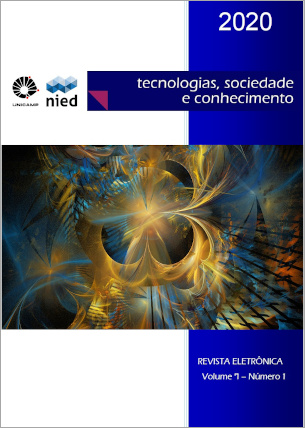Abstract
Computational thinking, widely disseminated and used in several works in the literature, has been considered as one of the fundamental skills of the human intellect, as well as reading, writing and arithmetic. This article describes the development and application of an educational tool entitled “Plugged-in” to stimulate concepts of Computational Thinking. To evaluate the tool an exploratory case study was conducted in a public school with elementary school students, through an educational workshop. The analysis of the data collected through interviews, questionnaires and direct observation, indicates that the tool stimulated the concepts of Computational Thinking: abstraction, algorithms and procedures, decomposition and simulation.
References
ANDRADE, D.; CARVALHO, T.; SILVEIRA, J.; CAVALHEIRO, S.; FOSS, L.; FLEISCHMANN, A. M.; AGUIAR, M.; REISER, R. Proposta de atividades para o desenvolvimento do pensamento computacional no ensino fundamental. In: WORKSHOP DE INFORMÁTICA NA ESCOLA (WIE), CONGRESSO BRASILEIRO DE INFORMÁTICA NA EDUCAÇÃO (CBIE), 2013, São Paulo, Anais…. v. 1, p. 169-178. Disponível em: http://www.br-ie.org/pub/index.php/wie/article/view/2645/2299. Acesso em: 15 abr. 2019.
BNCC - BASE NACIONAL COMUM CURRICULAR. Base Nacional Comum Curricular: Educação é a Base, 2018. Disponível em: http://basenacionalcomum.mec.gov.br/images/BNCC_EI_EF_110518_versaofinal_site.pdf. Acesso em: 1 jun. 2019.
BRACKMANN, C. P. Desenvolvimento do pensamento computacional através de atividades desplugadas na educação básica. 2017. Tese (Doutorado em Informática na Educação). Universidade Federal do Rio Grande do Sul, Porto Alegre, 2017
CAVALCANTE, A.; COSTA, L. D. S.; ARAUJO, A. L. Um estudo de caso sobre competências do pensamento computacional desenvolvidas na programação em blocos no code.org. In: WORKSHOPS DO CONGRESSO BRASILEIRO DE INFORMÁTICA NA EDUCAÇÃO (WCBIE), CONGRESSO BRASILEIRO DE INFORMÁTICA NA EDUCAÇÃO (CBIE), 2016, Uberlândia, Anais… v. 5, p 1117-1126. Disponível em: http://www.br-ie.org/pub/index.php/wcbie/article/view/7037. Acesso em: 15 abr. 2019.
FALCÃO, A. P.; LEITE, M. D.; TENÓRIO, M. M. Ferramenta de apoio ao ensino presencial utilizando gamificação e design de jogos. In: SIMPÓSIO BRASILEIRO DE INFORMÁTICA NA EDUCAÇÃO (SBIE), CONGRESSO BRASILEIRO DE INFORMÁTICA NA EDUCAÇÃO (CBIE), 2014, Dourados, Anais... v. 25, p. 526-533. Disponível em: http://www.br-ie.org/pub/index.php/sbie/article/view/2981. Acesso em: 15 abr. 2019.
FALCÃO, T. P.; BARBOSA, R. “aperta o play!” análise da interação exploratória em um jogo baseado em pensamento computacional. In: SIMPÓSIO BRASILEIRO DE INFORMÁTICA NA EDUCAÇÃO (SBIE), CONGRESSO BRASILEIRO DE INFORMÁTICA NA EDUCAÇÂO (CBIE), 2015, Maceió, Anais... v. 26, p. 419-428. Disponível em: http://www.br-ie.org/pub/index.php/sbie/article/view/5284. Acesso em: 15 abr. 2019.
GROS, B. The impact of digital games in education. First Monday, v. 8, n. 7, p. 6–26, 2003. Disponível em: https://www.mackenty.org/images/uploads/impact_of_games_in_education.pdf. Acesso em: 15 abr. 2019.
HAREL, I. E.; PAPERT, S. E. Constructionism. Westport, CT, US: Ablex Publishing, 1991.
ISTE, CSTA. Computational Thinking: leadership toolkit. 2011. Disponível em: https://c.ymcdn.com/sites/www.csteachers.org/resource/resmgr/471.11CTLeadershiptToolkit-S.pdf
JUNQUEIRA, S. H. F. Ensino de Lógica de Programação com o uso de Ferramenta Visual voltada para Dispositivos Móveis com Android. In: ENCONTRO NACIONAL DE ENGENHARIA DE PRODUÇÃO (ENEGEP), 2016, João Pessoa, Anais... Disponível em: http://www.abepro.org.br/biblioteca/TN_STO_235_367_30052.pdf. Acesso em: 27 jul. 2020.
MARCONDES, N. A. V.; BRISOLA, E. M. A. (2014). Análise por triangulação de métodos: um referencial para pesquisas qualitativas. Revista Univap, v. 20, n. 35, p. 201-208.
PAPERT, S. LOGO: computadores e educação. São Paulo: Editora Brasiliense, 1985.
PEREIRA, N. P.; SILVA, K. d. S.; ODAKURA, V. Tools to support the teaching-learning of computational thinking in Brazil. In: CONFERÊNCIA LATINO-AMERICANA DE INFORMÁTICA (CLEI), CONFERÊNCIA LATINO-AMERICANA DE TECNOLOGIAS DE APRENDIZAGEM (LACLO), 2018, São Paulo, Anais... n. 183872. Disponível em: http://cleilaclo2018.mackenzie.br/docs/LACLO/FULL/183872.pdf. Acesso em: 15 abr. 2019.
PIAGET, J. Piaget’s Theory. In: MUSSEN, P. H. (Ed.) Carmichael’s Manual of Child Psychology 3rd ed., v. 1. New York: Wiley, 1970.
PIMENTEL, M. Estudo de caso em sistemas colaborativos. In: ___Sistemas Colaborativos Rio de Janeiro: SBC/Elsevier. 2011. cap. 25. Disponível em: https://www.dropbox.com/sh/ftcq79y2aqq16u4/_sFxQwE8iO. Acesso em: 15 abr. 2019.
QUEIROZ, R. L.; SAMPAIO, F. F.; SANTOS, M. P. Pensamento computacional, robótica e educação. Revista Tecnologias, Sociedade e Conhecimento, v. 4, n. 1, 2017. Disponível em: http://pan.nied.unicamp.br/ojs/index.php/tsc/article/view/183/213. Acesso em: 15 abr. 2019.
SAVI, R.; VON WANGENHEIM, C. G.; ULBRICHT, V.; VANZIN, T. Proposta de um modelo de avaliação de jogos educacionais. Revista Novas Tecnologias na Educação, v. 8, n. 3, 2010. Disponível em: https://seer.ufrgs.br/renote/article/view/18043. Acesso em: 15 abr. 2019.
SBC - SOCIEDADE BRASILEIRA DE COMPUTAÇÃO. Referenciais de Formação em Computação: Educação Básica, 2017. Disponível em: http://www.sbc.org.br/files/ComputacaoEducacaoBasica-versaofinal-julho2017.pdf. Acesso em: 6 ago. 2019.
SILVA, K. D. S.; PEREIRA, N.; ODAKURA, V. Mapeamento sistemático: estratégias para o ensino-aprendizagem do pensamento computacional no Brasil. In: CONGRESSO INTERNACIONAL DE INFORMÁTICA EDUCATIVA (TISE), 2018, Brasília, Anais… v. 14, p. 319-329. Disponível em: http://www.tise.cl/Volumen14/TISE2018/319.pdf. Acesso em: 15 abr. 2019.
VIANNA, M. J. S.; FILHO, Y. V. S; ADLER, I. K.; LUCENA, B. F.; RUSSO, B. Design Thinking - Inovação e Negócio. Rio de Janeiro: MJV Press, 2012.
VICTAL, E.; MENEZES, C. Avaliação para aprendizagem baseada em jogos: Proposta de um framework. In: SIMPÓSIO BRASILEIRO DE JOGOS E ENTRETENIMENTO DIGITAL (SBGames), 2015, Teresina. Anais... p. 970–977. Disponível em: http://www.sbgames.org/sbgames2015/anaispdf/cultura-full/147549.pdf. Acesso em: 15 abr. 2019.
WING, Jeannette M. Computational thinking. Communications of the ACM, v. 49, n. 3, p. 33-35, 2006.

This work is licensed under a Creative Commons Attribution 4.0 International License.
Copyright (c) 2020 Kennedy dos Santos Silva, Nícolas Pierim Pereira, Valguima Victoria Viana Aguiar Odakura


